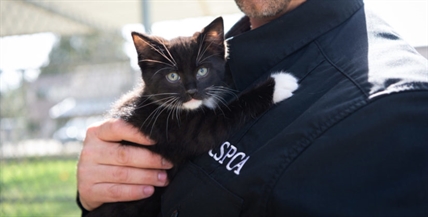Elevate your local knowledge
Sign up for the iNFOnews newsletter today!
Sign up for the iNFOnews newsletter today!
Selecting your primary region ensures you get the stories that matter to you first.

A new feline virus has been discovered, thanks to actions taken by B.C. SPCA staff during an outbreak.
At the Vancouver SPCA, eight cats all became ill in a single day in 2018. When the tests came back negative for parasites, the team was concerned.
“We knew within a few days we were dealing with something very unusual and unlike anything we’d faced before,” senior manager Dr. Emilia Gordon said in a SPCA release.
“We started saving samples and reaching out to external experts right away. That enabled us to eventually contribute to the discovery of the new virus.”
An investigation showed that the Quesnel SPCA had also been affected by the same flu-like virus, and that their "patient zero" came from a litter of kittens from a rural area near Williams Lake.
Two cats from Quesnel introduced the illness to the Vancouver shelter. Because the symptoms of vomiting and diarrhea are fairly common in cats, it spread rapidly before being detected, Gordon said.
Upon studying the samples collected by the B.C. SPCA, researchers from the University of California discovered the new species of parvovirus.
Of the 43 cats affected by the virus, all but two recovered, which were euthanized due to other medical problems.
Gordon credits the high recovery rate, in part, to the team's response to the outbreak.
“As soon as we understood we were dealing with something unusual, our first goal was to stop the outbreak so more cats wouldn’t get sick," she said.
"Our second goal was to try to get answers for our teams, for the cats, and for other shelters and veterinarians facing unexplained gastrointestinal (GI) outbreaks in cats under their care.”
Although more research on the virus is required, Gordon hopes that the B.C. SPCA's response to the outbreak will serve as a model to other shelters on how to effectively control infection with an all-hands-on-deck approach.
“If shelters and their veterinarians encounter a situation like this, they should persist in trying to get answers by reaching out to university and laboratory specialists," she said.
"Partnerships between industry scientists, academic researchers and veterinarians doing work ‘on the ground’ are key in identifying new viruses and understanding whether, and how, they cause disease.”
To contact a reporter for this story, email Brie Welton or call (250) 819-3723 or email the editor. You can also submit photos, videos or news tips to the newsroom and be entered to win a monthly prize draw.
We welcome your comments and opinions on our stories but play nice. We won't censor or delete comments unless they contain off-topic statements or links, unnecessary vulgarity, false facts, spam or obviously fake profiles. If you have any concerns about what you see in comments, email the editor in the link above.
News from © iNFOnews.ca, . All rights reserved.
This material may not be published, broadcast, rewritten or redistributed.

This site is protected by reCAPTCHA and the Google Privacy Policy and Terms of Service apply.
Want to share your thoughts, add context, or connect with others in your community?
You must be logged in to post a comment.